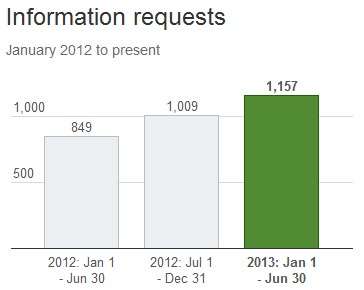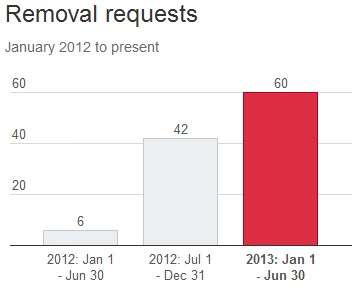Governments Get Snoopier and Bossier With Twitter

You know you've arrived as an online media operation when governments take an interest in who is speaking out, and make efforts to muzzle what's published. That's definitely the case with Twitter, the microblogging platform that started as an outlet for exhibitionist ADHD sufferers, only to become a powerful medium for sharing news and grassroots organizing. According to the company's latest transparency report, governments around the world are issuing ever-more demands for information about the service's users, and stepping up efforts to suppress tweeted content.
From January 1 through June 30 of this year, Twitter received 1,157 government requests for private information about users and accounts, up from 849 during the same period in 2012. Of those, authorities in the United States were responsible for 902 requests. Twitter complied in whole or part with 55 percent of all requests — 67 percent of those originating in the U.S.

Interestingly, roughly 20 percent of information requests issued by American authorities were "under seal," meaning that Twitter was forbidden to fulfill its usual policy of informing users about requests for their private information.
Censorship — formally framed as "removal requests" — are also on the rise, though the numbers are much smaller. Twitter reports 60 such requests from January 1 through June 30 of this year, up from six during the same period in 2012. Such requests target "illegal content," the definition of which variies from country to country. Twitter reports complying in part or in whole with 38 percent of all such demands. Targeted content ranged from "a defamatory account in Brazil" to "hate speech" in France to Russian accounts "found to have promoted drug use or suicide."
There's no mystery as to why Twitter has become increasingly prominent on government radar screens. Turkish protesters used the service to coordinate demonstrations that enraged officials in that country, and to bypass mainstream media outlets that ignored their concerns. Twitter has also been an important outlet for Egyptians during that country's political turmoil; social networks overall are considered to have played a major role in bringing down the Mubarak regime.
That kind of grassroots power tends to make government officials jittery.
Editor's Note: As of February 29, 2024, commenting privileges on reason.com posts are limited to Reason Plus subscribers. Past commenters are grandfathered in for a temporary period. Subscribe here to preserve your ability to comment. Your Reason Plus subscription also gives you an ad-free version of reason.com, along with full access to the digital edition and archives of Reason magazine. We request that comments be civil and on-topic. We do not moderate or assume any responsibility for comments, which are owned by the readers who post them. Comments do not represent the views of reason.com or Reason Foundation. We reserve the right to delete any comment and ban commenters for any reason at any time. Comments may only be edited within 5 minutes of posting. Report abuses.
Please to post comments


the newspaper brought us nation-states, the radio world war, the tv gave us the welfare state, maybe twitter give us...
The welfare state was around well before television.
Anthony's weiner
Weiner-Holder 2016
The LOL state.
well the radio gave us social security, along with civil war veterans on the payroll. but the tv pushed the war into the far east jungle (where the cameras couldn't follow) and instead gave us pictures of obscene wealth and poverty.
Well, obviously, the solution is to return to a per-literate culture where all information comes from the epic poems of illiterate bards.
books were around long before any of these propaganda tools, when is the last time your read one?
Anyone who thinks that governments (including the U.S. government) are interested in monitoring and controlling the internet because of terrorism is an idiot. The biggest threat to any government comes, not from outside threats, but from its own citizens and that is exactly why domestic communications collection is so important to them.
The biggest threat to individual freedom doesn't come from some foreign power or terrorist threat, but from one's own government. While the 9/11 terrorists killed a bunch of people and knocked down a few buildings, the real damage happened at the hands of the U.S. government which encouraged and leveraged off the resulting panic to expand their powers beyond anything imaginable before 9/11.
The idea that it's government's job to "protect our freedom" is idiocy. Only citizens can protect their own freedom and, if they don't take an active roll in doing so, they will inevitably lose it.
Why do you hate buildings?
Twitter might accede to 67% of US Government requests, but it's a lot more dismissive of foreign government requests. Australia is in third place (behind the US and Japan) when it comes to asking Twitter for user info, but Twitter only hands it over in 25 percent of cases. Perhaps it will have to go offshore to some tiny island state* to avoid US Government pressure and retain credibility with users
* like a tax haven but with wifi
Henry. true that Ralph`s bl0g is amazing, last saturday I got a top of the range Jaguar E-type from bringing in $5100 this past four weeks and-just over, ten-grand last-munth. without a doubt its the most financially rewarding I have ever had. I started this 3 months ago and pretty much straight away began to make at least $85 per hour. I work through this website, http://www.Day34.com